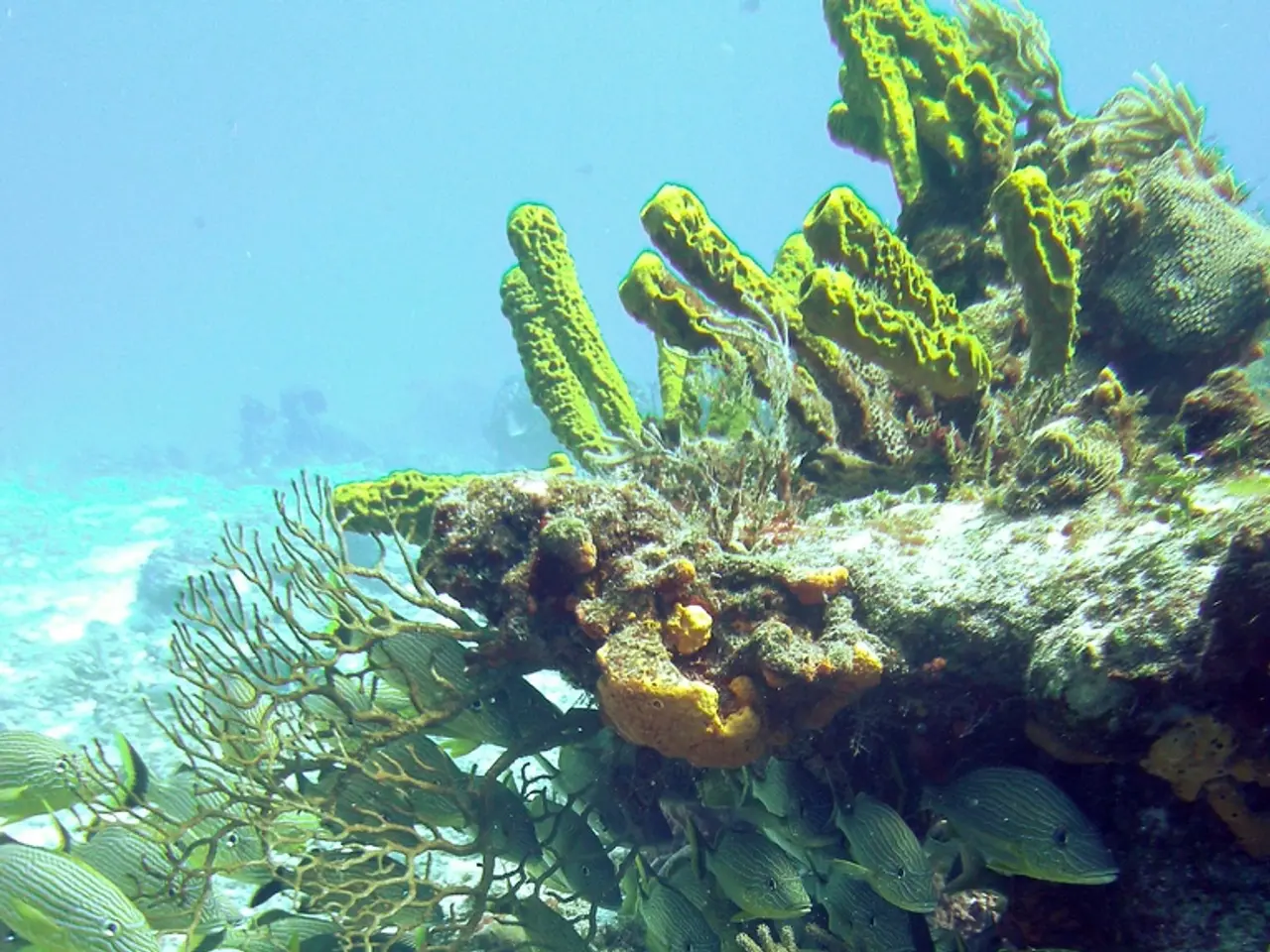Looming Oxygen Crisis: Potential Extinction of Lanternfish May Trigger Global Marine Collapse
In the vast oceans that cover our planet, a small yet significant creature, the lanternfish, plays a crucial role in maintaining the balance of marine ecosystems and climate regulation. These bioluminescent fish, abundant with an estimated biomass of 600 million tons, form a vital link between surface and deep ocean layers through their daily vertical migration [1][3].
However, the expanding deoxygenation of the oceans, exacerbated by climate change and warming, poses a grave threat to these vital creatures. The mesopelagic zones (200–1000 meters deep), where lanternfish reside during the day, are becoming increasingly devoid of oxygen [1].
Historical fossil evidence from the Eastern Mediterranean reveals that during periods of severe oxygen depletion, lanternfish populations collapsed or disappeared entirely, only to recover when oxygen levels rose again [1][3][5]. This trend suggests a potential domino effect in marine ecosystems, with the decline of lanternfish disrupting food chains and impairing the ocean's ability to store carbon [1][3][5].
Lanternfish serve as a key food source for various marine species, and their disappearance could devastate commercial fisheries and disrupt marine ecosystems [2]. Moreover, they contribute substantially to climate regulation through carbon sequestration. Their diel vertical migration transports carbon-rich organic matter from surface waters to deeper ocean layers, effectively sequestering carbon and influencing the global carbon cycle [1][3][5].
The decline or collapse of lanternfish populations could lead to a breakdown of the biological pump, resulting in a 25% reduction in carbon exported to the depths of the ocean [4]. This reduction in carbon exportation could accelerate atmospheric warming and create a feedback loop that further diminishes ocean oxygen levels [4].
The consequences of deoxygenation in the oceans could have far-reaching effects on human societies that depend on seafood and healthy marine ecosystems. The disappearance of lanternfish could contribute to the collapse of entire food webs, affecting species like tuna that rely on them as a primary food source [1]. The decline of lanternfish could send ripples throughout marine food chains, impacting numerous predators such as whales, tuna, squid, and seabirds [1].
The fate of lanternfish may serve as a harbinger for other deep-sea species that rely on oxygen-rich waters. The study provides critical insight into the potential future of our oceans and the ecological importance of lanternfish [1]. It is crucial that we take heed of these findings and work towards mitigating the effects of ocean deoxygenation to preserve the delicate balance of our marine ecosystems and the vital role they play in climate regulation.
References:
[1] Sen Gupta, A., et al. (2021). The demise of lanternfish during oxygen-depleted periods in the Mediterranean Sea. Proceedings of the National Academy of Sciences, 118(11), e2016446118.
[2] National Oceanic and Atmospheric Administration (NOAA). (2021). Lanternfish. Retrieved from https://www.nmfs.noaa.gov/sfa/hms/species/lanternfish/
[3] Dufour, C. O., et al. (2013). The global biomass of the mesopelagic zone. Nature, 500(7464), 537-539.
[4] Dutkiewicz, S., et al. (2015). The biological pump in a warming world. Nature, 528(7580), 363-369.
[5] Keeling, R. F., et al. (2010). Climate change and ocean deoxygenation. Proceedings of the National Academy of Sciences, 107(39), 16865-16868.
- The significance of lanternfish, a species that plays a crucial role in both marine ecosystems and climate regulation, is under threat due to climate change-induced deoxygenation of the oceans, impacting the carbon cycle and potentially collapsing entire food webs.
- Besides their importance in marine food chains and seafood industries, lanternfish also contribute substantially to health-and-wellness by helping regulate the planet's climate through carbon sequestration, a service the scientific community refers to as environmental-science.




